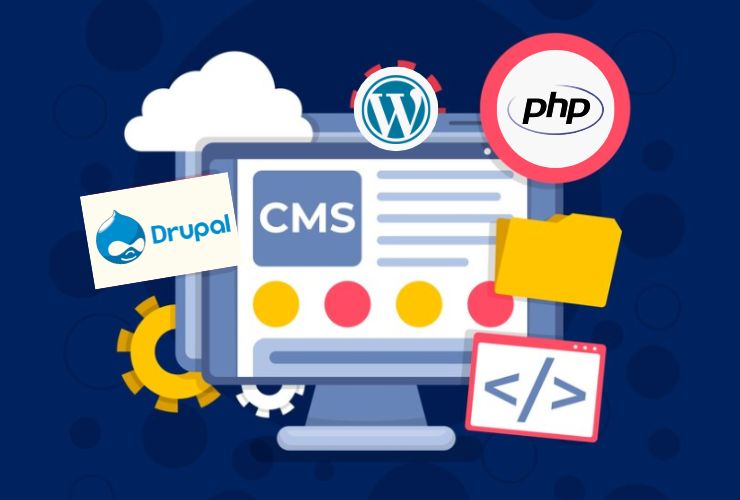PHP and Content Management Systems are at the core of modern web development. PHP is one of the most-used web development languages and sits at the heart of almost every major content management system. Among them are WordPress and Drupal — two of the most widely used platforms, each offering a unique set of features tailored to different business needs. But what truly sets them apart in today’s competitive market? Let’s explore why these platforms are so powerful and how PHP drives the robust capabilities behind them.
The Role of PHP in Content Management Systems
PHP is a server-side scripting language with flexibility, efficiency, and ease of use. Millions of websites are powered by this script; therefore, it’s ideal to develop a content management system. More specifically, both WordPress and Drupal make use of PHP to deliver the users the most intuitive interfaces along with more powerful functionalities. These platforms also enable the users to edit their websites without necessarily needing extensive knowledge of coding. In a nutshell, PHP is the back end that enables these content management systems to deliver user experiences of excellence.
Why WordPress succeeds
- User-Friendly Interface WordPress is famous for its user-friendly interface. It is possible to create and manage content even for non-technical users. The dashboard is intuitive, and adding posts, pages, and media is a very simple process without any coding.
- The enormous library of plugins available in WordPress enables users to add certain features and functionalities with just a few clicks. Be it SEO tools or e-commerce solutions, one can enhance his sites very easily.
- The Strong Community Support WordPress also boasts of a large, active community of developers and users. The community provides support, tutorials, and updates so that the platform remains secure and updated.
- SEO-Friendly With best practices of SEO in mind, WordPress makes it very easy for the users to optimize their content to rank on search engines. There are multiple plugins available that help to improve the on-page SEO to rank high in search results.
Why Drupal Flourishes
- Strong Customization Drupal is known for flexibility and customization. Developers can develop very specific solutions for business with specific requirements, making it the go-to choice for large businesses and government sites.
- Strong Security Features Drupal is very security-oriented. Such sites which deal with sensitive data require robust security. It has strong security in-built with regular updates to safeguard the user information.
Content Types and Taxonomy
Drupal enables users to create their content types and taxonomies to make the management of the content very easy. This is very crucial for complex sites that have a lot of content.
Multilingual Capabilities
This CMS has multilingual support with in-built support for many languages. This makes it ideal for organizations targeting a global audience since it provides the functionality to create content in various languages seamlessly.
Conclusion
WordPress and Drupal have, therefore, managed to take their respective places in the content management systems world, due to PHP’s powerful capabilities. WordPress is more usable and community-supported while Drupal is more customizable and secure. In the final analysis, it is your decision which will best suit your project needs. With the knowledge of both platforms’ strengths, you can make a decision that suits your goals.
Need a powerful CMS tailored to your business? Let Empirical Edge build or optimize your PHP CMS for performance, scalability, and seamless content control.
Frequently Asked Questions
A CMS is software that helps you create, manage, and publish digital content without deep coding knowledge. Empirical Edge builds and customizes CMS platforms to match your business processes and digital goals.
PHP is a proven server-side language that powers many popular CMS platforms due to its speed, flexibility, and wide community support. Empirical Edge uses PHP to develop robust, scalable, and secure CMS solutions tailored to your needs.
Yes. Empirical Edge provides expert customization, plugin development, performance optimization, security enhancements, and integration services for WordPress, Drupal, and other PHP-based CMS platforms.
All industries — including eCommerce, education, healthcare, media, and enterprise services — benefit from flexible CMS platforms. Empirical Edge delivers CMS platforms tailored to your industry’s requirements.
Development time varies based on project scope. Empirical Edge evaluates your requirements and provides clear timelines and milestones for your CMS project.














